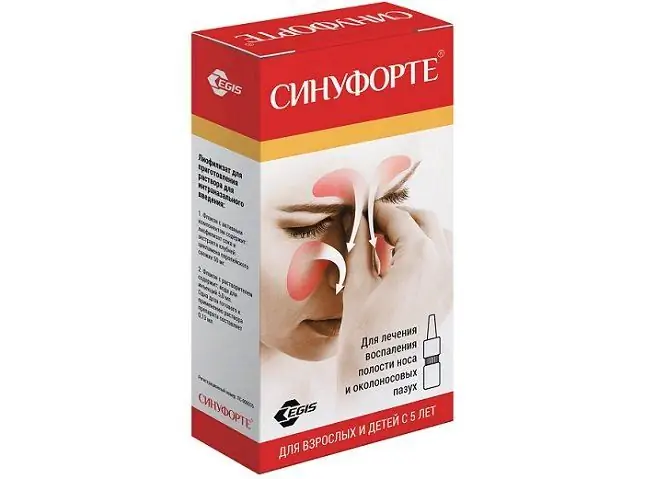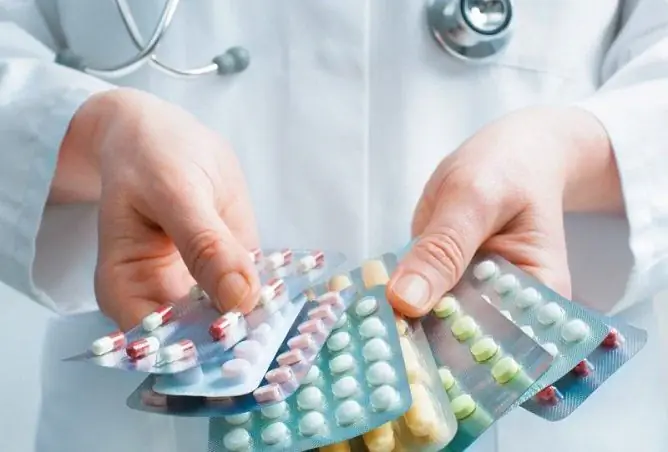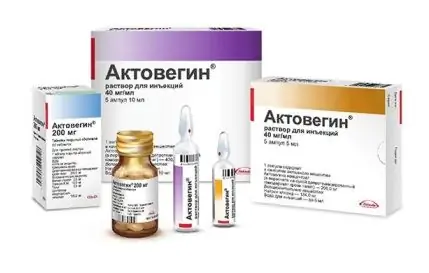- Author Rachel Wainwright wainwright@abchealthonline.com.
- Public 2023-12-15 07:39.
- Last modified 2025-11-02 20:14.
Finasteride-Teva
Finasteride-Teva: instructions for use and reviews
- 1. Release form and composition
- 2. Pharmacological properties
- 3. Indications for use
- 4. Contraindications
- 5. Method of application and dosage
- 6. Side effects
- 7. Overdose
- 8. Special instructions
- 9. Application during pregnancy and lactation
- 10. Use in childhood
- 11. In case of impaired renal function
- 12. For violations of liver function
- 13. Use in the elderly
- 14. Drug interactions
- 15. Analogs
- 16. Terms and conditions of storage
- 17. Terms of dispensing from pharmacies
- 18. Reviews
- 19. Price in pharmacies
Latin name: Finasteride-Teva
ATX code: G04CB01
Active ingredient: finasteride (Finasteride)
Producer: Teva Pharmaceutical Works Private Limited Company (Hungary)
Description and photo update: 2020-10-03
Prices in pharmacies: from 249 rubles.
Buy

Finasteride-Teva is a drug for the treatment of benign prostatic hyperplasia (BPH).
Release form and composition
The drug is produced in the form of film-coated tablets: capsule-shaped, blue, smooth on one side, on the other side - engraving "FNT 5"; the core of the tablet on the cross section is almost white or white (7 or 10 pcs. in a blister, in a cardboard box 4 blisters of 7 pcs. or 2, 3, 6, 10 blisters of 10 pcs. and instructions for use of Finasteride-Teva) …
1 tablet contains:
- active substance: finasteride - 5 mg;
- additional components: pregelatinized starch, sodium carboxymethyl starch (type A), microcrystalline cellulose, sodium lauryl sulfate, magnesium stearate, povidone-K30, lactose monohydrate 200 mesh (mesh) (off-system unit of measure for meshes / sieves);
- film shell: Opadrai blue 03G20795 - macrogol-400, hypromellose-6cP (E464), titanium dioxide (E171), macrogol-6000, aluminum indigo carmine varnish (E132).
Pharmacological properties
Pharmacodynamics
Finasteride is a synthetic 4-azosteroid, a specific competitive inhibitor of type II 5-α-reductase, an intracellular enzyme that converts testosterone to dihydrotestosterone (DHT), which is a more active androgen. In BPH, an increase in the volume of this gland depends on the transformation of testosterone into DHT in it, the active substance Finasteride-Teva effectively reduces the level of the latter in the blood serum and in the prostate tissue. Inhibition of DHT formation leads to a decrease in the size of the prostate gland, an increase in the maximum rate of urine outflow and a decrease in the severity of symptoms caused by prostatic hyperplasia.
The active ingredient does not have an affinity for androgen receptors and does not affect the lipid profile, does not affect the mineral density of bone tissue, and also does not change the plasma concentration in the blood of estradiol, cortisol, prolactin, thyroxine and thyroid stimulating hormone.
With the use of finasteride for 4 years at a daily dose of 5 mg in patients with BPH, a decrease in serum DHT content by approximately 70% and a decrease in prostate volume by an average of 20% were recorded when compared with the initial values. In addition, the level of prostate specific antigen (PSA) decreased by about 50% compared to baseline, which led to a decrease in the growth of prostate epithelial cells. The serum testosterone content in the course of the research increased by an average of 10-20%. When Finasteride-Teva was used for 7-10 days in the case of referral of patients for prostatectomy, there was a decrease in the level of DHT in the prostate tissue by about 80% and an increase in testosterone levels by 10 times compared with that before the start of therapy.
According to the studies conducted, the administration of finasteride to patients with BPH with moderate or significant symptoms of this disease by 51% reduced the risk of urological complications and surgical interventions, including transurethral resection of the prostate or prostatectomy, as well as acute urinary retention requiring catheterization. In addition, Finasteride-Teva provided a pronounced and sustained decrease in the volume of the prostate gland, an increase in the maximum velocity of urine flow and an improvement in symptoms.
Pharmacokinetics
After oral administration of Finasteride-Teva, the process of absorption of the active substance in the gastrointestinal tract (GIT) is completed after 6-8 hours. Bioavailability is approximately 80% and does not depend on concomitant food intake. The maximum concentration of finasteride (C max) in plasma is fixed approximately 2 hours after oral administration. The drug binds to plasma proteins by 93%, the apparent volume of distribution is 76 liters, the plasma clearance is 165 ml / min. In the case of repeated use of Finasteride-Teva over a long period in therapeutic doses, a slight accumulation of the main component may be noted in the body. With a course of oral administration of the drug in a daily dose of 5 mg, the content of finasteride in the blood plasma reaches 8-10 ng / ml and remains stable for a long time.
7-10 days after the start of taking finasteride is detected in the cerebrospinal fluid, but does not reach significant concentrations there. Finasteride-Teva is also found in seminal fluid, while its content is 50-100 times lower than the plasma level in the blood.
The metabolic transformation of the active substance occurs in the liver. The agent does not show a significant effect on the activity of isozymes of the cytochrome P 450 system. In the course of the studies, 2 metabolites of the drug were identified that exhibit a less pronounced inhibitory effect on 5-α-reductase than finasteride. The half-life (T 1/2) of the drug is approximately 6 hours. The drug is excreted in the form of metabolites: 39% - with urine, 57% - with feces.
In patients with chronic renal failure (CRF) of varying severity (with creatinine clearance of 9-55 ml / min), the rate of excretion of a single dose of Finasteride-Teva corresponded to that of healthy volunteers. The degree of binding of finasteride to plasma proteins in patients of these groups was also identical, since part of the drug's metabolites, normally excreted in the urine, in patients with renal insufficiency is eliminated in the feces. This fact is confirmed by a decrease in the number of metabolites in the urine in such patients and its simultaneous corresponding increase in the feces. Therefore, people with renal insufficiency who are not receiving hemodialysis treatment do not need to change the dose of Finasteride-Teva.
In elderly patients, the clearance of Finasteride-Teva decreases slightly, in patients over 70 years of age, T 1/2 increases to about 8 hours. However, this effect has no clinical significance, and therefore dose adjustment is not required for the elderly.
Indications for use
The use of Finasteride-Teva is recommended in the following cases:
- treatment and control of BPH, prevention of urological complications in order to reduce the threat of acute urinary retention and reduce the need for surgical interventions, including transurethral resection of the prostate and prostatectomy;
- therapy aimed at reducing the volume of the enlarged prostate gland, improving urination and reducing the severity of symptoms caused by BPH, including in combination with doxazosin, to reduce the threat of progression of symptoms associated with BPH.
Contraindications
Absolute:
- syndrome of glucose-galactose malabsorption, lactase deficiency, lactose intolerance;
- obstructive uropathy;
- age up to 18 years;
- hypersensitivity to any component of the drug.
Relative (Finasteride-Teva should be used with caution):
- elderly age;
- liver failure;
- a large volume of residual urine and / or a significantly reduced urine flow (it is required to take Finasteride-Teva under medical supervision to detect possible obstructive uropathy).
Finasteride-Teva is used to treat male patients only.
Finasteride-Teva, instructions for use: method and dosage
Finasteride-Teva tablets are taken orally with a liquid. The effectiveness of the product does not depend on food intake. The tablets must be swallowed whole; they must not be crushed, divided or chewed.
It is recommended to take the drug once a day at a dose of 5 mg (1 tablet). The course is up to 6 months, to achieve a clinical effect, prolongation of treatment is allowed. Finasteride-Teva can be used as monotherapy, as well as in combination with the α-blocker doxazosin.
Side effects
In studies conducted over 4 years involving 1524 patients taking finasteride and 1516 patients receiving placebo, due to adverse drug-related effects, 74 participants (4.9%) in the finasteride group were discontinued in comparison with 50 participants (3.3%) from the placebo group. Due to side effects associated with impaired sexual function (which are the most common adverse effects), 57 patients (3.7%) who received the drug and 32 (2.1%) received placebo completed therapy.
Over the course of 4 years of studies, undesirable clinical manifestations caused (probably or definitely) by finasteride, the incidence of which was more than 1%, were violations in the field of sexual function, skin rash and tenderness of the mammary glands.
In a 7-year, placebo-controlled study, in which 18,882 healthy men took part, according to the results of puncture biopsy obtained in 9060 patients, prostate cancer was diagnosed in 18.4% of men taking the drug, and in 24.4% taking a placebo. Prostate cancer, with a Gleason score of 7-10, was detected in 280 patients (6.4%) in the finasteride group and 237 patients (5.1%) in the placebo group. Based on the data of the additional analysis, it can be assumed that in men treated with the drug, an increase in the incidence of cancer with a high degree of malignancy is associated with diagnostic errors caused by the effect of therapy on the size of the prostate gland. Of all detected cases of prostate cancer, on average, 98% of the tumor at the time of diagnosis was classified as intra-capsular - stage T1 / T2. In this study, the clinical significance of the results in relation to the tumor process according to the Gleason scale with a score of 7-10 has not been determined.
Currently, the relationship between long-term therapy with Finasteride-Teva and the development of breast neoplasia in men has not been identified.
In studies with the combined use of finasteride at a daily dose of 5 mg and doxazosin at a daily dose of 4 or 8 mg, the safety and tolerability profile of this therapy was generally comparable to that of its components used alone.
Adverse reactions of Finasteride-Teva recorded during post-registration use (the frequency of these violations is unknown; since reports of their development were received voluntarily, it was not always possible to reliably determine the frequency of these effects and the relationship with the use of the drug):
- on the part of the psyche: depression, weakening of libido (it can also be noted after the drug is discontinued);
- on the part of the genitals and mammary glands: sexual dysfunction (including ejaculation disorders and erectile dysfunction), which can be fixed after discontinuation of therapy; pain in the testicles; male infertility and / or deterioration in the quality of seminal plasma (according to available reports, after the abolition of Finasteride-Teva, the quality of ejaculate returned to normal or increased); secretion of secretions from the mammary glands;
- from the immune system: hypersensitivity reactions - urticaria, pruritus, angioedema (including the face, lips, larynx).
When assessing the results of laboratory tests, it is required to take into account that the plasma concentration of PSA in patients taking Finasteride-Teva is reduced. A rapid decrease in the PSA content in most cases is noted during the first months of the course, and then it stabilizes at a new level, usually half of the value established before the start of therapy.
Overdose
In patients who received finasteride once in a dose of up to 400 mg, as well as with a course of administration for 3 months in daily doses up to 80 mg, the occurrence of any negative reactions was not observed.
In case of a possible overdose of Finasteride-Teva, there are no specific treatment recommendations.
special instructions
Finasteride-Teva is prescribed for patients whose prostate volume exceeds 40 cm³.
During the period of drug therapy, the patient needs to be monitored by a urologist. Before starting the course, it is required to exclude diseases that stimulate obstruction of the urethra and an increase in prostate volume - prostate cancer, hypotension of the bladder, violation of its innervation, urethral stricture, infectious prostatitis.
Before using Finasteride-Teva and periodically during treatment, rectal examination and other methods for diagnosing prostate cancer should be performed. For these purposes, a study of the plasma PSA level in the blood is also carried out. An initial content of this antigen in excess of 10 ng / ml indicates the need for further examination, including a prostate biopsy. If the PSA level is in the range of 4-10 ng / ml, additional examination is also recommended.
It should be taken into account that the PSA content in men with a prostate tumor and in men without this lesion may largely coincide. Therefore, in patients with BPH at normal PSA concentrations, including at an initial level below 4 ng / ml, the presence of prostate cancer cannot be excluded, regardless of the use of the drug. Finasteride-Teva provides men with BPH with a decrease in PSA content by an average of 50%, even with an existing prostate tumor. As a result, with a decrease in PSA levels in patients with BPH, it should be borne in mind that this fact does not exclude the presence of concomitant prostate cancer.
According to the results of the analysis of PSA values, in patients receiving therapy with Finasteride-Teva for 6 months or more, the PSA level should be doubled to compare with the normal values of this indicator in persons not using finasteride. This correction retains the sensitivity and specificity of PSA analysis and the ability to detect prostate tumors.
When observing any prolonged increase in PSA concentration during treatment with finasteride, careful examination is required to establish the cause of this effect, which may also include non-compliance with the drug use regimen.
Finasteride-Teva does not significantly reduce the percentage of free PSA fractions (the ratio of free to total PSA).
Influence on the ability to drive vehicles and complex mechanisms
There are no reports of adverse effects of Finasteride-Teva on the ability to drive vehicles and control other complex moving machinery.
Application during pregnancy and lactation
Finasteride Teva is not indicated for use in women.
Pregnant women and women of reproductive age need to beware of contact with lost integrity or crushed tablets of the drug due to the possible penetration of finasteride into the body and the subsequent threat to the development of the male fetus. Inhibitors of type II 5-α-reductase, including finasteride, by blocking the conversion of testosterone to DHT, can provoke abnormal development of the external genital organs in the male fetus.
There is no data on the excretion of Finasteride-Teva in breast milk.
Pediatric use
Finasteride-Teva is not used in patients under 18 years of age.
With impaired renal function
Patients with renal failure who are not receiving hemodialysis treatment do not need to change the dose of Finasteride-Teva.
For violations of liver function
Due to the lack of experience in treatment, Finasteride-Teva should be used with caution in patients with hepatic insufficiency because of a possible increase in the plasma concentration of finasteride. There is no need to change the dose of the drug.
Use in the elderly
It is not required to adjust the dose of Finasteride-Teva in the elderly.
Drug interactions
Clinically significant interaction of Finasteride-Teva with other substances / drugs has not been established.
There were no adverse, clinically significant manifestations of the interaction of finasteride with the following agents: digoxin, propranolol, phenazone, warfarin, glibenclamide, theophylline, paracetamol, angiotensin-converting enzyme inhibitors (ACE inhibitors), α- and β-adrenergic blockers, acetylsalicylic acid channels (BMCC), nitrates (in all dosage forms), blockers of H 2 -histamine receptors, diuretics, HMG-CoA reductase inhibitors (statins), non-steroidal anti-inflammatory drugs (NSAIDs), benzodiazepines, quinolones.
Analogs
Finasteride-Teva analogs are Penester, Alfinal, Proscar, Zerlon, Finpros, Proterid, Finast, Urofin, Finasterid-OBL, etc.
Terms and conditions of storage
Store out of the reach of children at a temperature not exceeding 30 ° C.
The shelf life is 3 years.
Terms of dispensing from pharmacies
Dispensed by prescription.
Reviews of Finasteride-Teva
According to the few reviews of Finasteride-Teva found on specialized forums, it is an effective drug used to treat BPH. The drug helps to reduce the volume of the prostate, improve urination and weaken the severity of BPH-related symptoms, and also reduces the risk of urological complications and the need for surgical interventions.
The disadvantages of Finasteride-Teva include the appearance of side effects in the form of decreased libido and erectile dysfunction, which are of a transient nature.
Finasteride-Teva price in pharmacies
The price of Finasteride-Teva in the form of film-coated tablets (5 mg) can be 250-350 rubles. for 30 pcs. packaged.
Finasteride-Teva: prices in online pharmacies
|
Drug name Price Pharmacy |
|
Finasteride-Teva 5 mg film-coated tablets 30 pcs. 249 r Buy |

Maria Kulkes Medical journalist About the author
Education: First Moscow State Medical University named after I. M. Sechenov, specialty "General Medicine".
Information about the drug is generalized, provided for informational purposes only and does not replace the official instructions. Self-medication is hazardous to health!






